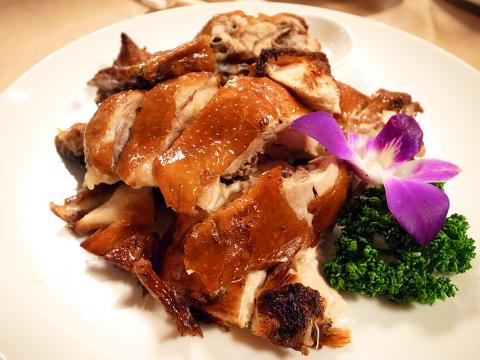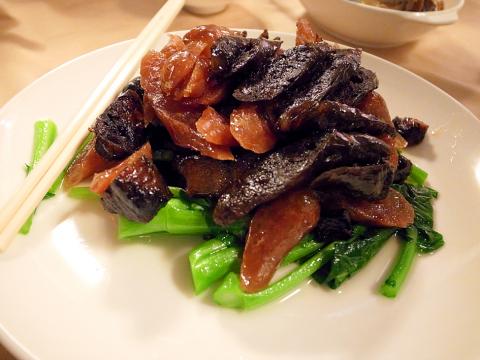On entering Ting Chen Fang (鼎珍坊), the first thing that stands out are the many celebrity endorsements it has received since opening in 2009.
The signatures of former premier Hau Pei-tsun (郝柏村), food writer Lucille Han (韓良露), Japanese artist Takashi Murakami and the likes adorn the wall and sing the praises of renowned Hong Kong chef Wong Chan-kau (黃燦球) and the restaurant’s septuagenarian proprietor Chang Ying-lai (張應來).
With expectations running high, my dining companions and I settled into our seats on a recent Sunday evening.

Photo: Ho Yi, Taipei Times
The restaurant was full, populated by wrinkly patrons topped with gray hair, and parents and their children enjoying family gatherings.
The menu is divided into two. One section comprises Wong’s acclaimed Cantonese fare and the other contains Chang’s
home cooking.

Photo: Ho Yi, Taipei Times
To start, we decided to give the proprietor’s signature homemade dishes a whirl.
First up was tongue-swallowing vegetables (吞舌菜, NT$280), composed of black jelly fungus, bamboo shoots, mushrooms, soya beans and vegetarian chicken (素雞), made from a type of bean curd. Though unassuming looking, the dish is so named because it is said to be so yummy that patrons who eat it will swallow their tongues by accident. It was indeed flavorful, but our tongues went nowhere.
The beef and gnocchi-like noodles with clear broth (清燉牛肉手工麵片, NT$580) won approval from our group for its streaky, tendon-rich chunks of beef and thinly sliced noodles, which unlike their thicker cousins allow the flavor of the broth to shine through. The consomme, though, was oversalted.
As for Wong’s acclaimed Hong Kong fare, we ordered the crispy-skinned chicken (脆皮雞, NT$480 for half a bird, NT$960 for a whole one). Encased in a layer of luscious fat, the meat was mostly succulent. The breast meat, however, was too dry.
By far the best item was the braised beef and silk noodles curry casserole (咖哩牛肉粉絲煲, NT$520). The dish stood out for its marbled, thin slices of tender beef and the smooth noodles that soaked up the savory gravy. The hearty bowl went well with the equally appetizing Hong Kong-style steamed rice with preserved meats (什錦臘味飯, NT$780), which is enough for a group of four.
Toward the end of our meal, it became apparent that all the endorsements and enthusiastic reviews had raised expectations too high.
Only when I put aside my presumptions, did Ting Chen Fang show its true colors as an old-school restaurant offering traditional, hearty Chinese fare and helpful, friendly service.

June 23 to June 29 After capturing the walled city of Hsinchu on June 22, 1895, the Japanese hoped to quickly push south and seize control of Taiwan’s entire west coast — but their advance was stalled for more than a month. Not only did local Hakka fighters continue to cause them headaches, resistance forces even attempted to retake the city three times. “We had planned to occupy Anping (Tainan) and Takao (Kaohsiung) as soon as possible, but ever since we took Hsinchu, nearby bandits proclaiming to be ‘righteous people’ (義民) have been destroying train tracks and electrical cables, and gathering in villages

This year will go down in the history books. Taiwan faces enormous turmoil and uncertainty in the coming months. Which political parties are in a good position to handle big changes? All of the main parties are beset with challenges. Taking stock, this column examined the Taiwan People’s Party (TPP) (“Huang Kuo-chang’s choking the life out of the TPP,” May 28, page 12), the Democratic Progressive Party (DPP) (“Challenges amid choppy waters for the DPP,” June 14, page 12) and the Chinese Nationalist Party (KMT) (“KMT struggles to seize opportunities as ‘interesting times’ loom,” June 20, page 11). Times like these can

Dr. Y. Tony Yang, Associate Dean of Health Policy and Population Science at George Washington University, argued last week in a piece for the Taipei Times about former president Ma Ying-jeou (馬英九) leading a student delegation to the People’s Republic of China (PRC) that, “The real question is not whether Ma’s visit helps or hurts Taiwan — it is why Taiwan lacks a sophisticated, multi-track approach to one of the most complex geopolitical relationships in the world” (“Ma’s Visit, DPP’s Blind Spot,” June 18, page 8). Yang contends that the Democratic Progressive Party (DPP) has a blind spot: “By treating any

Swooping low over the banks of a Nile River tributary, an aid flight run by retired American military officers released a stream of food-stuffed sacks over a town emptied by fighting in South Sudan, a country wracked by conflict. Last week’s air drop was the latest in a controversial development — private contracting firms led by former US intelligence officers and military veterans delivering aid to some of the world’s deadliest conflict zones, in operations organized with governments that are combatants in the conflicts. The moves are roiling the global aid community, which warns of a more militarized, politicized and profit-seeking trend